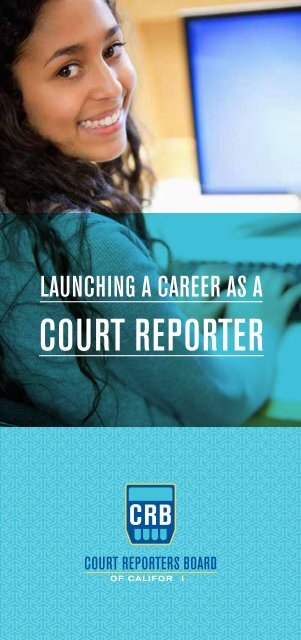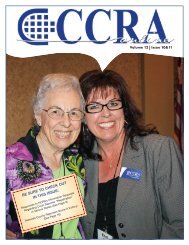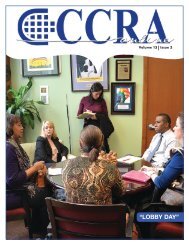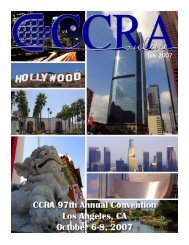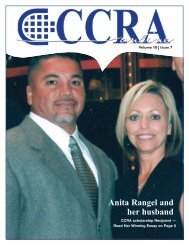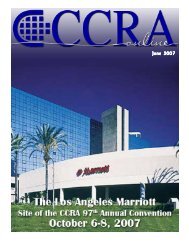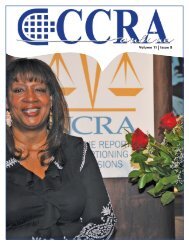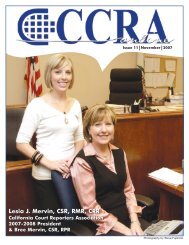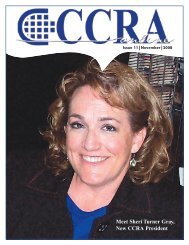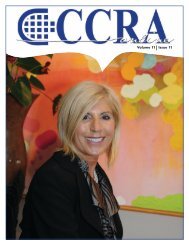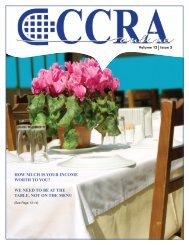Student Career Brochure - Court Reporters Board
Student Career Brochure - Court Reporters Board
Student Career Brochure - Court Reporters Board
- No tags were found...
You also want an ePaper? Increase the reach of your titles
YUMPU automatically turns print PDFs into web optimized ePapers that Google loves.
Launching a career aS acOurT rePOrTer
If you’re looking for an interestingand lucrative career, court reportingcould be the job for you.<strong>Court</strong> reporters — also knownas certified shorthand reporters(CSRs) — are highly trained, licensedprofessionals who transcribe spokenwords using a stenotype machine ina wide variety of settings – not justin court.CSRs fill a critical role in thejustice system: They provideverbatim transcripts of judicialproceedings and ensure that nothingcompromises their accuracy. <strong>Court</strong>reporters are present in courthearings, trials, and other litigationrelatedsessions such as depositions.But opportunities in this field gobeyond the courtroom.1
OppOrtunities and Benefits It’s an exciting time for CSRs. According to theU.S. Bureau of Labor Statistics, employmentfor them will grow by 18 percent between2008 and 2018, reflecting the demand forreal-time broadcast captioning and translating.This growth rate is faster than the average forall occupations in that time period.Broadcast captioners, also calledstenocaptioners, use court reporting skills onthe stenotype machine to caption live televisionprograms for deaf and hard-of-hearing viewerswith software that instantly displays speechas text so it can be read immediately. Thisincludes news, emergency broadcasts, sportsevents, and more.<strong>Court</strong> reporters use the same process forwebcasts, instantly transmitting captions to thecomputer screens of all parties via the Internet.The stenotype machine enables court reportersto write words using a letter or a combinationof letters to represent a sound, a word, or aphrase. This allows them to write text muchfaster than on a standard computer keyboard.2
In addition, the skills gained on the stenotypemachine may prepare you for other careeroptions such as:**Rapid data entry.Scoping (computerized editing of transcriptsfor court reporters).Legal secretary.** Paralegal.Medical transcribing.*<strong>Court</strong> reporting schools offer shorthandmachine theory and speed-building classesthat prepare students for the state licensingexam. They also offer intensive instruction inEnglish grammar, punctuation, spelling andword usage, legal and medical terminology,deposition and court procedures, computeraidedtranscription programs and currentCalifornia laws related to court reporting.The English education and legal and medicalterminology may provide other career optionsor a foundation for pursuing higher education.CSRs can be independent contractors or runtheir own firms. Work hours are usually flexibleand transcription is often performed at home.Annual salaries range from $30,000to $100,000 or more, based on howmuch you want to work and whereyou live. Incomes can average morethan $60,000 a year, according to theNational <strong>Court</strong> <strong>Reporters</strong> Association.3
What it takesBecoming a licensed CSR requires passinga three-part licensing exam, usually afterattending a State-approved court reportingschool. Having an out-of-state license orappropriate work experience can also qualifyyou for the exam. CSR school programs aredesigned to take three to four years. Coursesare self-paced, challenging, and require selfdisciplineand a high degree of motivation.The curriculum is largely skills-based, andpractice builds speed levels required to takethe licensing exam, which requires 200 wordsper minute with a 97.5 percent accuracy rate.Academic homework is also required.So, court reporting school is a full-timejob — for a while. Here are the minimumrequirements to graduate:SubjeCtSHourS of InStruCtIonEnglish 240Legal 150Medical 120Transcript Preparation 25Resource Materials 5Apprentice Training 60Technology 60Typing skills45 WoRdS PER MINUTEtotal Academic Hours 660Approximate machine hours 2,3004
ChOOsing a sChOOlBefore enrolling in a court reporting program,do your research. Start by talking to staff atprospective schools, particularly admissionscounselors. Smaller schools without this rolemay put you in touch with an actual teacher.Here are some questions you should ask:******How long can one expect to be enrolled ona full-time basis or on a part-time basis?does this include students that started theprogram from the beginning as well as thosewho transferred in?What is the total cost of attending this school,including tuition, books, supplies, and gettinga machine? What financial aid is available?How many tests are required at each speedlevel to progress to the next speed level?How long should it take to progress in eachspeed level at this school? Each schoolshould be able to provide a detailed chartof the approximate time it should take toprogress in each speed class according totheir students’ records. The chart shouldidentify the average length of time it takesat that school, based on actual data fromstudents’ records.How many candidates did this school sendto the CSR exam last year and how manypassed? The previous year?What are the school’s dropout and transferoutrates?6
Who accredits, approves, and recognizes*this school? (Check with both the <strong>Court</strong><strong>Reporters</strong> <strong>Board</strong> of California and the Bureaufor Private Postsecondary Education –both part of the California department ofConsumer Affairs – to find out if this schoolis on probation or has provisional approval orfull approval from these agencies.)***How many weekdays is this school closedper year? (Missed days extend the time ittakes to graduate.)How many hours per week does this schooloffer live dictation?does this school have a graduate placementprogram? If so, what percentage ofgraduates are placed after receiving theirCalifornia license?Next step: Visit potential schools. Some mayoffer tours or orientation classes. Ask to beput in touch with current students and recentgraduates for more information. Ask what theythink of the school, what its strengths andweaknesses are, how it helped students inreaching their goals and overcoming problems,and how it helped with placement aftergraduation. Ask working CSRs which schoolsthey would recommend and why.In addition, talk to staff at local depositionfirms: Ask their opinions about prospectiveschools. Try to job shadow current CSRs: Sit ina courtroom and observe the reporter working.See if they’re open to questions at breaks.7
COnsidering COstsCalculate the costs for attending the averagelength of time, as well as the longest lengthof time, at each prospective school. Be sureto ask the school about financial aid. If youare attending a private court reporting school,ask school officials if they provide a regularaccounting statement of the financial aidchecks and an itemization of where the moneygoes. Ask school officials what the policy isfor communicating increased indebtednessand whether students are notified whenapproaching the end of financial eligibility.Remember that any student loans incurredare real loans — meaning they have to bepaid back — whether or not you finish school.Research the costs of equipment and software.When your research is finished, enrollin the school that offers completeanswers to all your questions and isproperly accredited.8
Other resOurCesAlso visit:National <strong>Court</strong> <strong>Reporters</strong> Associationwww.ncraonline.orgwww.bestfuture.comCalifornia <strong>Court</strong> <strong>Reporters</strong> Associationwww.cal-ccra.orgCalifornia official <strong>Court</strong> <strong>Reporters</strong> Associationwww.cocra.orgdeposition <strong>Reporters</strong> Association of Californiawww.caldra.orgMore questions?Call the <strong>Court</strong> <strong>Reporters</strong> <strong>Board</strong> of Californiaat (877) 3-ASK-CRB or (916) 263-3660, orfax any questions to us at (916) 263-3664, orvisit www.courtreportersboard.ca.gov.<strong>Court</strong> <strong>Reporters</strong> <strong>Board</strong> of California2535 Capitol oaks drive, Suite 230Sacramento, CA 95833You can also call the Bureau for PrivatePostsecondary Education (BPPE) at(916) 574-7720; www.bppe.ca.gov.


